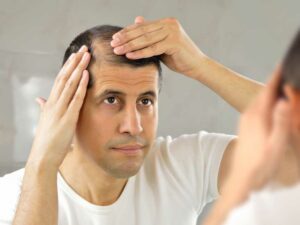 The hair loss industry has always been filled with a lot of hype and hollow promises. Many products arrive with great fanfare only to fade into obscurity when consumers don’t see real results from the product. The end result is a huge waste of money on the part of the average consumer and even worse — lost hair. If you are giving a worthless product time to work, then you are probably not using another product that could have potentially saved hair or even regrown it. In these days when there are multiple products that actually do work for many people to grow hair, it is even more critical to make wise decisions about what treatments to use.
The hair loss industry has always been filled with a lot of hype and hollow promises. Many products arrive with great fanfare only to fade into obscurity when consumers don’t see real results from the product. The end result is a huge waste of money on the part of the average consumer and even worse — lost hair. If you are giving a worthless product time to work, then you are probably not using another product that could have potentially saved hair or even regrown it. In these days when there are multiple products that actually do work for many people to grow hair, it is even more critical to make wise decisions about what treatments to use.
Many consumers who first start learning about hair loss online and seeking treatments do so when they have reached a point of desperation and feel they are going bald fast. They frequently jump onto the first treatment with spectacular claims without taking time to properly evaluate whether it is the best treatment for them. It is critical to realize that even though you are scared about where your head of hair is going, you need to realize you are not going to go bald next week and that you can take a few days or weeks to pick the proper treatments for you and not waste time and money on things that either don’t work at all or don’t work for your lifestyle. This article will present a list of pointers and critical questions to ask yourself when choosing what treatments to use.
Steps to becoming an educated hair loss consumer
- First, get educated! You can’t make a good decision if you are making it without knowing what you are really doing. Take some time to read the articles and guides on this site and other websites about what causes hair loss and the different treatments available. Take some time to read forums posts and view profiles of people who are saving their hair — don’t be afraid to ask questions if you’re not sure about something. There are a lot of people willing to help you in a community like this site. Learn about what the different options are so that you don’t jump on the first one that feels good. Follow the remaining suggestions in this article when evaluating products.
- Determine what treatments will fit with your lifestyle and goals. If two different treatments both really do work for a lot of people, that doesn’t mean both treatments fit you. Different people have different lifestyles and things they are willing to do. Do you live a fast paced lifestyle without a lot of free time? If so you will want to focus on treatments that are quick and easy. Got extra time? Maybe you won’t mind trying treatments that can take an hour or two out of the course of your week to do. Is your daily appearance critical for looking good at all times? Some treatments will make your hair look worse while they are in your hair — some can almost be used as styling aids that improve the look of your hair. Some you can’t tell they are in your hair at all. Some people don’t care what their hair looks like while using something as long as they are sure they will grow hair in the long run. How committed are you to maintaining a treatment? Most treatments require a lifetime (or at least as long as you plan for them to retain your hair) commitment to work, but not all do. Options such as transplants can give permanent long term results and even some daily treatments provide longer lasting benefits if you stop than others. It is important to think about things such as these and whether a particular product you are thinking of buying will TRULY fit into your lifestyle.
- Determine your budget. Some treatments are expensive, some are not. Most are at least a moderate monthly expense for most people. Figure out how much you are willing to spend per month and make sure all the potential treatments you want to use will fit in it over the long term for your finances. Stress is a hair killer — don’t cause yourself financial distress in order to save your hair — the stress may kill more hair than you save.
- Are you a risk taker, or do you go with tried and true? These days there are several scientifically proven products which will grow hair and save it in the majority of men. If you just want something that works and you don’t want to mess with trying a bunch of things, you’ll want to stick to proven treatments first. Some people are fascinated with trying the cutting edge new treatments that may have less proof for working. If your budget is limited, we recommend sticking to the tried and true to make sure you get results. If you have money that you can afford to not get a return on if a product doesn’t work, you may want to experiment.
- Evaluate the downside, not just the upside. ALL of the current treatments for hair loss have downsides and trade offs. Side effects are the most common downside. They can range from serious side effects such as sexual side effects for some treatments that block male hormones linked to hair loss to minor side effects such as irritation. What are you willing to put up with for your hair? Most people will not experience side effects for these treatments at all, but there is always a risk of experiencing them. If you study a lot and read reports from others about treatments, you can find out what these potential side effects and risks are before trying something rather than learning about it when they happen to you. One thing also to remember is not to be scared of trying every treatment because someone reported having a side effect. Just because one person had it doesn’t mean it will happen to you — and people who do experience side effects are most likely to discuss those problems on internet discussion forums rather than the person who is happy, growing hair and has no side effects — most people who have that experience don’t bother with posting online once they are happy with what they have.
- Nothing works for everyone. There are no treatments currently that work for everyone to produce a nice full head of hair. In other words, there is no cure currently. Don’t expect that whether you try the most proven treatments or the least, you are guaranteed of any results. Even in the treatments that have been scientifically proven that over 80% of men will keep or regrow hair, that leaves 20% (1 in 5) who will continue to lose hair. Once again, the person who a product doesn’t work for is most likely to post online about that, so balance the scientific evidence with personal experiences before reading one or two people saying ‘this product is worthless’ before you decide it really is.
Tips for Evaluating Products
Companies have caught up to the internet era and are very savvy about marketing online, generating hype for a product, and even posting fake testimonials on websites. Below are some tips to help you wade through the hype and not buy into the bull.
Science RULES! For some people science is a bad word, but science has given us most of the conveniences and medical advances we enjoy in the world today. For hair loss, the golden standard of science is the double-blind, placebo controlled, independent clinical study. This means that a product was compared with a product that does not work to show the difference between a working treatment and a non-working one, and to avoid the “placebo effect” where people want to believe something works so they judge that it is. Double-blind means the people running the study don’t know which people are on the real treatment and which are on the placebo, so that they can’t bias the results toward the non-placebo treatment. Independent studies are conducted by medical organizations or higher learning institutions and not by companies making treatments. This helps to insure that the people conducting the study have no vested interested in whether the results of the study are positive or negative. These are the types of studies you should be looking for, in order of importance and level of ‘proof’ of something working:
- Large scale, long term studies conducted by the National Institute of Health. The NIH is the only organization in the US capable of funding large scale, long term studies of treatments for different health problems. Although the NIH has never funded a study on hair loss, it has funded studies on the safety and other medical uses of products that are sometimes used in hair loss. For example, a recent study of Finasteride for the prevention of prostate cancer by the NIH showed that it was not only safe to use long term, but may help prevent prostate cancer in men with long term use.
- Phase III FDA Approval Studies. These are large scale studies of hundreds to thousands of people at one time which show that something does or doesn’t work in a large group of people, and also helps to determine the side effects in a large group of people. In a smaller group, you can get misleading results and not see side effects that may appear in a larger group. Large scale studies done for FDA approval are conducted by independent, professional organizations with no reason to bias results. These studies are the basis for whether a medicine is approved or not approved for treatment in the United States by the FDA. If a product is approved by the FDA based on these studies, you can be sure it will actually work closely in the % of people the studies claim. You can also generally know that a product is safe and know the side effects, although sometimes side effects are discovered after approval that are not known during the approval process.
- Published University Studies. Science and medicine departments at Universities across the country regularly study the effects of both new and approved medicines as part of their scientific studies and research. These studies are usually not as large scale as NIH or FDA Phase III studies, but they are usually very good indicators of whether something works. If a study is published in a major medical journal, it means it has been “peer-reviewed” by a group of professionals in that field to determine if the study was properly conducted. Although these studies are very good indicators, since they are small scale you sometimes see later studies that show conflicting results.
- Phase II FDA Approval Studies. These studies are small scale studies (usually of 40 – 100 people). Although these studies also show preliminary results for effectiveness, their primary purpose is showing that a product is safe enough to test in a large scale (Phase III) study. Phase II results should not be considered definitive, but are a good indicator.
- Company Funded Studies. Companies sometimes conduct surveys of their customers or fund small studies to be conducted of their products which are not peer-reviewed and published. These studies have to be taken with a grain of salt and are the least reliable, because you have to trust the company’s honesty as well as the fact that they are not as rigorously scientific as the above studies. Many are merely surveys of customers (not scientific at all since many people will think they are growing hair when they are not) or not placebo controlled. If you have no better information to go on for something, these are better than nothing at all. They could be completely true or completely unreliable. If many documented results and photos are provided, that helps lend credibility to these studies — however even with photos, companies show the best results not the worst.
Seeing Through the Hype
Companies are great at overtly and stealthily marketing their products. If you are an uneducated consumer, it is easy to be duped by these marketing strategies and believe the hype. Here are some good strategies for seeing through the hype:
- Before you accept someone’s results, judge the person. Many companies create fake profiles on online hair sites and then post as a regular member proclaiming the greatness of a product. The best way to judge how biased a person is is to look at what they think about other proven products and other products in general. If they are constantly bashing everything but one product, they are either a fake poster or someone who is so biased you can’t necessarily trust their opinion. Some people will bash specific types of products. For example, FDA conspiracy buffs who think all approved medicines are bought and paid for by large companies and will say they are all worthless. Or people who say nothing that is natural ever works and always attack natural products. If a person has an obvious bias, it is important to take that into consideration when judging their words. Another useful tool is how long the person has been around and whether they are respected. People who have been around a long time trying different products for their own hair loss and trying to help others, contributing their opinions, etc are more likely to be good judges than someone who just joined last week and is already posting about the great product he’s on.
- Look out for the new member glorifying one product and posting links. This is the most obvious type of scammer to observe. The first thing they do is post about their good experience with something and provide links to someplace you can buy it. JUST WALK AWAY.
- If it sounds too good to be true, it is!!! There is NO cure. When you see claims of 90%+ effectiveness or something that claims to work for everyone… don’t walk, run from it. These are the products people buy into, try, and you never hear about again in a few months. Also some treatments claim to have faster and immediate results. Hair growth is a long term process (this is why becoming educated about that process is very important) — no product is going to be growing hair for you next week. It takes months to see real results and for most current products, over a year to see maximal results. If a product has grand claims, make sure it has undeniable proof that it works.
- One or two good results photos. You’ve seen the sites. Great claims, sounds awesome. Just one or two results photos showing nice results. A product that works well for a lot of people will usually have multiple customer/patient photos showing results. Some small and new companies may not have these kinds of photos, but if they are making serious claims they should. You should also find some real people in online forums using these products and be able to see that they are having good results as well. If you can’t find any real people having real results from something, why should you think you will?
Surviving and Thriving in the Online Hair Loss Community
Although the internet is not a new place anymore, it is still a wild west frontier at times when it comes to bringing large groups of different people together in one place to discuss a topic. You get all kinds of different backgrounds, experiences, and personality types. Unfortunately you also get people with negative personality types who have nothing better to do with their time than attack others whom they don’t like. Here are a few tips for surviving in the sometimes cold and brutal world of online hairloss forums.
- Find a place where the moderators and owners are active. Active oversight of a forum means they are probably keeping away the more negative personality types and scammers. It also means there will be someone to help you if you do butt heads with a problem personality.
- Find a place whose philosophy you agree with. Some people who run websites have very specific views on what works for hair loss and block any viewpoints they don’t agree with. If the site you are on doesn’t agree with the treatments you are interested in, you are going to be butting your head against a wall trying to get help there. There are several well done websites for hair loss on the internet with differing philosophies. Our philosophy is at Regrowth.com is that many things work for some people, and we want to help people find the right treatment for them and get results. We don’t care what it is as long as it works!
- Beware of the “gang bang.” There are certain groups of people who have a very rigid outlook on what they want to see and what they believe in. They do not like to tolerate anyone who questions their philosophy, opinions, or experiences and will attack as a group any person who tries to present an opposing opinion. They frequently try to discredit any poster they do not agree with, call them a fake, a shill, a scammer or some other kind of attack to make the person look bad in the eyes of other visitors who are unaware of what is going on. This is one of the reasons to find the right place for discussing. Beware of people who are constantly posting negatively about certain other people, groups or sites. This is where being on a site with good moderating is of great benefit.
- Relax, enjoy life, and don’t take it too seriously. As I said before, stress is a hair loss killer. Don’t let the antics of others you might see get you too worked up or take it too seriously. They are just words on a screen. Don’t stress out over it if some jerk mouths off to you on an internet forum — it’s not worth losing your hair for.
- Watch out for the big egos. Some people who are frequent posters on internet websites do so because they enjoy having a feeling of self-importance. Beware of the people who boast too much about themselves or their group of friends. These are the people most likely to attack those who they don’t agree with. These people are usually easy to spot if you are looking for it.
As a final word, and I wish this didn’t have to be said, but it does… never believe 100% something you read on the internet. Judge it and evaluate it based on what you know and what you’ve read in this article, but always know that many people you meet online have hidden motivations you may not know about. Don’t become rigid due to something you read online. Be willing to change your opinion when you find out things may not be what they seem. Even things we believe as scientific fact sometimes change when we find out new knowledge. Be flexible. Be smart. Be educated. If you take these lessons to heart, you will have a good chance of finding something that will work for you and avoid the pitfalls of the hair loss world. See you online!





